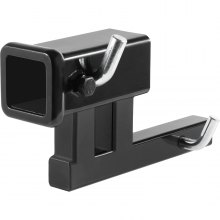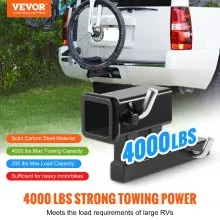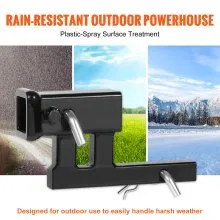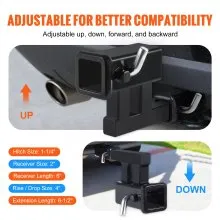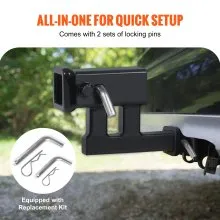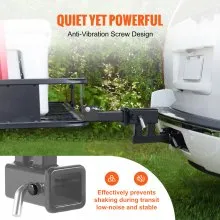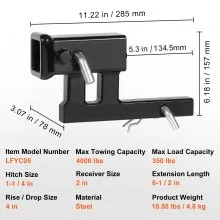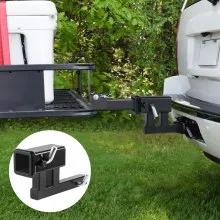Find the Best Hitch Receivers by VEVOR for Safe and Reliable Towing
Hitch receivers are the last safety key for securing your trailer, camper, and many more during towing. From the tens of thousands of heavy loads to attaching accessories, a good hitch receiver will always be different for a safe and secure journey. In this guidebook, we will be able to point you in the right direction toward buying the best VEVOR hitch receiver for your towing needs, always ready for a safe and secure trip.
What Is a Hitch Receiver: A Complete Guide
Hitch receiver is a critical piece of equipment in attachment or connecting trailer or accessories to the vehicle, it has the shape of a square tube to be inserted by a hitch-mounted device, such as a bike rack, trailer, cargo carrier, and others. VEVOR's Trailer Hitch Receiver is quality to none for stable and dependable towing, for personal or commercial use.
Types of Hitch Receiver
Following are types of hitch receivers commonly used:
Class 1 Hitch Receiver
If you have something light, you only need small trailers or a bike rack. Class 1 hitch receivers can be used up to a towing capacity of 2,000 pounds.
Class 2 Hitch Receiver
For medium-duty towing applications with capacities as high as 3,500 pounds. Class 2 hitch receivers are great for small campers as well as utility trailers.
Class 3 Hitch Receiver
Class 3 hitch receivers is the most popular type, which supports towing capacity of up to 8,000 lbs, for trailers as well as trailers' accessories.
Buying Guide: Key Considerations for Hitch Receivers
When selecting a hitch receiver, consider the following factors to make the right choice for your towing requirements:
Towing Capacity
A hitch receiver must be chosen according to the vehicle's towing capacity. For example, a class 3 hitch receiver has a maximum towing capacity of 8,000 lbs. Conversely, towing medium to heavy trailers is also possible at home. A class 1 or 2 hitch receiver will be sufficient when towing light loads or accessories.
Receiver Size
Receivers are available in a size range of 1.25 inches or 2 inches. It all depends on your trailer or accessories and the size that will suit you. The most frequently used receiver size. However, the 2-inch receiver type proves to be quite sturdy and versatile for most towing purposes.
Durability & Material
Determine hitch receivers made from quality material such as coated steel for corrosion resistance. In most cases, towed users are subjected to hostile and more challenging conditions while towing; therefore, a hitch receiver ensures it is efficient with time.
Superior Features of VEVOR Hitch Receivers
Following are the premium features of the VEVOR trailer hitch receiver:
Heavy-Duty Construction
VEVOR trailer hitch receivers are constructed from high-strength steel. Our best hitch receiver features a stable platform for heavy-duty towing.
Powder Coating to Prevent Rust
Each VEVOR hitch receiver has a rugged powder coating to combat rust and corrosion and ensure apparent performance in every condition.
Easy Installation
VEVOR trailer hitch receivers are designed to allow easy installation in the box-product preparation process. They're easy for even the DIY hobbyist to install.
VEVOR Best Hitch Receiver: Top Picks & Reviews
Following are the hot-selling VEVOR best hitch receiver and its testimonial:
VEVOR Class 3 Trailer Hitch, 2-Inch Receiver, Q455B Steel Tube Frame
The VEVOR Class 3 hitch receiver has its receiver tube with 2 inches and Q455B steel frame suitable for towing medium and large trailers. It has an 8,000 lb capacity that will fit perfectly with more extensive applications and constant use. Durable powder coat protections ensure that weather will not affect it and will last for a long time.
Testimonial: Sturdy and reliable! This hitch receiver has made my towing jobs more accessible and more secure.
VEVOR Class 3 Trailer Hitch, 2-Inch Receiver, Q455B Steel Tube Frame
Another top choice, the VEVOR Class 3 hitch receiver comes with the same strength and reliability as its counterpart, with a 2-inch receiver and heavy-duty Q455B steel construction. Ideal for hauling larger trailers or attaching heavy accessories, this hitch receiver is both durable and versatile.
Testimonial: This is an excellent receiver hitch for towing large trailers or attaching heavier accessories.
FAQs
How do I know which hitch receiver class I need?
Depending on how heavy your trailer or accessory is that you wish to pull, this is what will give you the type of hitch receiver that you will need. For bike racks and other tiny trailers, use a Class 1 hitch receiver. Class 3 can tow up to 8,000 lbs of the biggest trailers or equipment. Always check your vehicle's towing capacity before choosing a hitch receiver.
What are a hitch receiver and a hitch ball, and how do they differ?
A hitch receiver is attached to the car and part of the tow system, while the hitch ball will be connected to the trailer and the receiver. The hitch ball is mounted to the ball mount and inserted into the receiver tube. The hitch ball must match the receiver's size for the correct towing functionality.
How often should I inspect my hitch receiver for safety?
Always ensures that you inspect your hitch receiver just before use, whereby you will identify the existence of some wear or damage. It would be best to look out for rust or cracks in your hitch or looseness in your bolts since these may compromise the safety of your hitch receiver. It would help to inspect your receiver tube to ensure that some debris is blocking your ball mount.
Conclusion
VEVOR hitch receivers are robust, easy to use, and versatile, making them a prime choice for all your towing requirements. Small trailers, heavy machinery, and bulkier-variety machinery get tugged with absolute strength and reliability by our hitch receivers. With Class 1-3 options available, VEVOR gives you the hitch receiver best suited for your vehicle and requirements.







































































































































